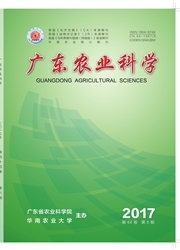

 中文摘要:
中文摘要:
对长江水系中江西都昌和闽江水系中福建建瓯2个群体23尾长体鳜细胞色素b全基因的1 141 bp序列进行分析,发现15个变异位点,其中简约信息位点7个,共有13个单倍型,总体单倍型多样度(Hd)和核苷酸多态度(Pi)分别为0.933(±0.030)和0.00241(±0.030),呈现出高单倍型多样性和低核苷酸多样性的特点.中性检验结果显示Fu's Fs为显著负值,核苷酸不配对分析呈现单峰分布,表明长体鳜在历史上经历过种群扩张事件,推测扩张年代约为6万年前,为更新世晚期.在邻接树和简约性网络图中不同地理来源的单倍型交错分布,群体间的Fst和Nm值分别为0.06667和3.5.AMOVA分析表明,长体鳜群体内遗传差异(95.17%)大于群体间(4.83%)遗传差异,遗传变异主要是集中在群体内部,表明都昌和建瓯的长体鳜群体间没有出现明显遗传分化,可作为一个管理保护单位.
 英文摘要:
英文摘要:
1 141-bp sequence of mitochondrial DNA cytochrome b gene of 23 individuals from 2 populations of Siniperca roulei collected in Duchang of Yangtze River and Jianou of Minjiang River was sequenced. 15 variable sites including 7 parsimony informative sites defined 13 haplotypes, the global haplotype diversity (Hd) and nucleotide diversity (Pi) were 0.933 (± 0.030) and 0.00241 (±0.030) respectively, indicating a pattern of high haplotype diversity and low nueleotide diversity. The significant negative values of neutral test of Fu's Fs and the unimodal mismatch distribution pattern revealed a historical population expansion deduced at about 60 000 years ago. With the intertwined haplotypes of various geographic populations in Neighbor- joining and TCS tree, the Fst and Nm between two populations were 0.06667 and 3.5 respectively, 95.17% genetic variation occurred between populations was much higher than 4.83% genetic variation oecmxed in populations by AMOVA analysis, indicating that no obvious genetic differentiation was found and they could be protected as a single management unit.
 同期刊论文项目
同期刊论文项目
 同项目期刊论文
同项目期刊论文
 期刊信息
期刊信息
